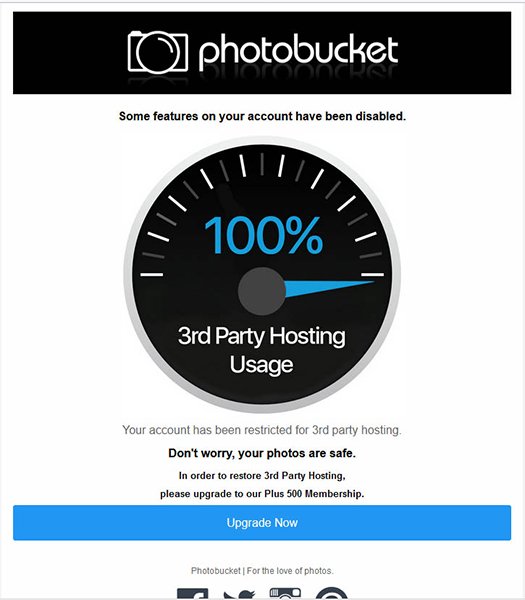5 Legendary Internet Services (And What They've Become)
by Luis Prada
Internet popularity comes and goes like the severed tail of a lizard. For every popular site, there are a handful waiting in the wings to replace it, even if the first site never actually went away. That, sadly, is what ends up happening a lot on the Internet. The sites you used to go to all the time weren’t buried 6-feet under in an Internet graveyard the second you stopped paying attention. Some are still alive, just maybe not the way you thought they were.
Myspace
Long gone are the days where you had firm confirmation of your importance, based on your placement in someone's Top Eight. The hours spent leaving stupid proto-meme pictures on a friend’s wall as “Butterfly” by Crazy Town autoplayed on their page were worth it when you saw the precious words “Online Now!” beside their profile pic.
It wasn’t a very interesting social media site, but it was better than Friendster, and it gave us the one thing we cherished more than anything else: it made us feel closer to Dane Cook. Believe it or not, that was a big deal back then.
The audio on that page has a "repeat" button. Who's that for?
What It's Become
MySpace has become the distilled essence of every social media site. It’s just a catalog of famous people. Long gone are the days of regular folks connecting with classmates and far-off relatives. Now it’s like a poorly designed combination of Spotify and E! News. It’s hard to tell if regular people even use the site anymore since every celebrity's page is filled with spam links and budding musicians promoting their mix tapes the way pilot fish hang around sharks.
They also have original shows, because this is the future, where the prize in the cereal box is a 13 episode order of a web series. There aren’t many, and the few that are there are uninspired twists on the current Comedians In Cars Getting Coffee/Carpool Karaoke trope of interviewing famous people while doing mundane things. The saddest part is that the “new releases” and “recommended” sections reveal empty pages when clicked -- which literally means they have nothing new and nothing good.
Exhibit A. And B. And also all of the other exhibits.
Napster
Believe it or not, there was once a time when people used the Internet to obtain music illegally without getting a menacing letter from their ISP informing them that if they don’t stop, they will be sued for more money than exists on Earth. Ah, those were the days, back when you had to download an album song by song, and the chances of getting the actual tracks you were looking for were as low as your chances of not getting a virus. Usually you’d end up with some odd alternate version of the song like Phil Collins playing “In The Air Tonight” on a kazoo during a show in Norway. Though admittedly, that would kind of rock.
That might sound like a nightmare compared to the bastion of organization that is modern day digital music distribution, both legal and illegal ... but for all its annoyance, it was a gift from the technological gods. It was never so easy to find music that compelled you to follow it down a rabbit hole of discovery, one track leading to the next, one artist to another in no time at all, opening you up to worlds of music you’d never known.
My list would have been nothing but Pantera and James Taylor.
What It's Become
Napster sold out. It went legit, like the underground band whose garage tracks you use to download with Napster back in 2000, who now sell their songs to car companies trying to market cheap, midsize sedans to Gen-Xers.
After getting sued into oblivion by what felt like the totality of the music industry, Napster died in 2001. It was resurrected in 2008, then in the ultimate sellout move, it was bought by Best Buy and merged with another defunct music service, Rhapsody. It didn’t rise through the ranks and become a corporation on its own. It was consumed and assimilated by the world it rebelled against.
Nothing says underground like "start your free trial."
The once controversial underground music piracy app that spawned countless peer-to-peer clients is now a totally legit primary provider of on-demand music for the IHeartRadio app, among others. As it’s stuck in a cubicle with all the other working stiffs, Napster stares out a window at all the bit torrent sites living dangerously and misses the reckless days of its youth.
ICQ
Who needed an original username when you could be assigned a randomly generated nine digit number like a prisoner? That was how people were greeted when they signed up for ICQ, and they liked it!
I still have the tattoo of my old ID.
ICQ is one of the forefathers of modern day messaging apps like What’s App and Facebook Messenger. AIM may have been the glitzier alternative, but it didn’t have ICQ’s functionality and ahead-of-its-time features. Yes, it was so ugly that it made people wonder if the user interface was built with cinder blocks, but it was the place for wasting time with all of your friends without having to look them in their cold, dead eyes.
What It's Become
Like a grandfather who refuses to age gracefully, ICQ is proving how painful it is to watch an originator turn their hat backward and speak in modern teenage slang. Such is the fate of ICQ, a once revolutionary chat service that’s now struggling to be an ill-fitting combination of SnapChat and Skype.
Wait, is their mood "YEAH!"?
It has video calling and real-time facial animations that can widen your eyes like an anime character or make you look like a dog. So there's that. But it will never be restored to its once mighty prominence when, in the early 2000s, it was the go-to messaging service for over 100 million people. Today, that number hovers somewhere around 11 million ... mostly in Russia.
That probably has a lot to do with how ICQ was purchased by a Russian billionaire who was on the lookout for an established instant messaging service to connect Russian citizens in the digital age. Hey, Russians have just as much of a right to pretend they’re working when there really talking to 12 different people as we do.
Neopets
A combination of Pokémon and Tamagotchi, freely available to play online. That small idea exploded into one of the biggest phenomena of the early internet.
In the beginning, simple word-of-mouth helped grow Neopets into a user base of hundreds of thousands. It attracted investors with deep pockets within a year of its launch, and that's no small feat for an internet based business in the early 2000s. Soon, it expanded into millions of users. It had its own line of toys, as well as tie-ins with McDonald’s and Burger King. It even had a card game designed by Wizards of the Coast.
Ah, the "Wheel of Excitement". They sure knew how to name things back then.
It’s hard to overstate just how ludicrously massive Neopets was in its heyday. If it had kept on its trajectory, today we would be living in a Ready Player One-style virtual world where every ‘80s pop culture reference would be replaced with Neopets.
What It's Become
Neopets is still around, largely the same as it was years ago. Even the website looks like it got stuck in 2002. What’s fascinating is how this cute innocent game has turned into a weird example of capitalism run amok.
"Screw your modern resolution! It's 640 x 480 or NOTHING!"
It always had a complex economy, and as such deserved to have a watchful eye overseeing the value of its in-game currency, Neopoints ... but it didn’t. Overtime, Neopoints inflated. All the good items that can’t be earned are hoarded, making some rare items so wildly expensive that they’ve reached mythical status in the eyes of new players. Because of that, most of the game’s economic power has been concentrated in the hands of a wealthy few.
Why anyone would want to hold on to fictional gear in a dying game universe is anyone’s guess. Maybe they want to be the richest people in the Neopets wasteland when the ax finally falls. Still, rather than completely overhaul its economy, its new owners instead cater the game to its older users who’ve stuck around all these years. Hey, if you can’t beat the digital hoarders who have ruined your fictional economy, you might as well pander to them.
Photobucket
Photobucket used to be the place to store your images. It was a photo utopia, where a professional photographer’s gorgeous shots of rhinos on an African safari could live alongside low-resolution gifs of the hamster dance. Back when we were all first learning how to share the endless stream of images we produced every day, Photobucket lived up to its name. It was a place we tossed a bunch of random pictures because we sure as hell didn’t want them on our computers where we could get in trouble if our parents found them.
Don't ask.
What It's Become
Image hosting sites like Imgur serve the same purpose as Photobucket but for a new generation that requires a stripped down, utilitarian image poster so they can deploy their memes at a moment’s notice. Its central service was needed in a time before social media sites allow users to post images on their own servers. Photobucket learned that the hard way. Twitter owned them for only a year before they realized they didn’t need a site with lagging traffic to host images, when they could just do it themselves.
Photobucket remains pretty much the same, except for one major detail: They learned everything they know about image hosting from Hans Gruber in Die Hard. They’ve taken hostage all of the images on their servers and will not release them to users unless they pay an exorbitant ransom.
"Just do as we ask, and everyone walks away safely. Understand?"
If users wanted to simply link to their photos, they would have to purchase a $100 a year subscription. Embedding photos would require a $400 yearly subscription, which is a hell of a lot to pay just to share your sexually charged Sonic the Hedgehog fan art with your forum buddies.
From one day to the next, and with no warning, thousands of third-party websites lost their image content. Photobucket could have politely notified their user base they were going to implement a small monthly fee that may increase as time goes on ... but instead, bereft of non-sociopathic ideas, they locked everyone’s vacation photos in a dank basement and sent a ransom note written in letters cut out of magazines.















